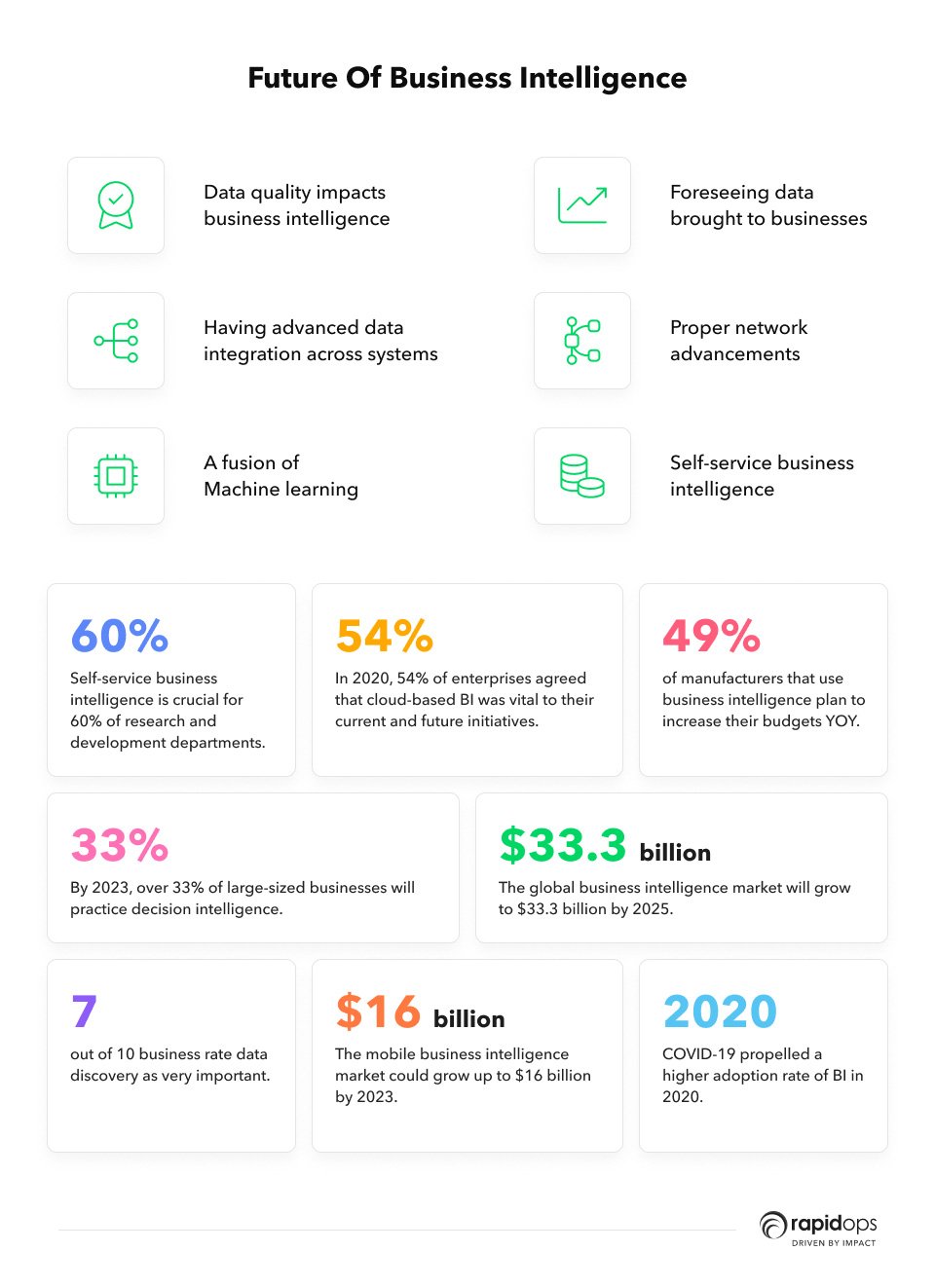- Analytics
- 9 min read
- August 2021
Business Intelligence Is Shaping the Future of the Retail Industry
In 2019, we wrote about Business intelligence and Analytics in the Retail Industry, which caught the attention of a lot of our readers. This content piece is a follow-up to that article.
Business intelligence is playing a significant role in revolutionizing every industry. In the last decade, data exploded and is growing in numbers. Insightful data visualizations and interactive business dashboards are taking priority over bulky spreadsheets.
2021 is going to be the year of data security and data discovery. Businesses will be able to procure clean and secure data.
Gartner expects the global revenue of BI to rise to $22.8 billion by 2020. Reuters foresees growth to $29.48 billion by 2022. The business intelligence market is booming and will continue as BI solutions grow.
Retailers are using insight-driven business models for understanding consumer behavior and informed decision-making. They must also deploy retail business intelligence to stay on top of the competition.
This article highlights the advantages of business intelligence in retail industry.
Importance of business intelligence in retail industry?
Let's delve a bit more into how BI will help in refining intelligent systems in retail industry. Retail is a diverse industry. Sustaining profitability in a smaller market is a persistent challenge for retailers. Retailers must optimize the value chain to meet ever-changing customer demands.
The continuous changes in trends create a fickle retail market. In such a dynamic environment, retailers need critical insight for :
- Plan success,
- Revenue generation / store,
- Location
- Region
- Product line
- Demographics
By implementing retail business intelligence into business operations, business owners can automate data collection revolving:
- Consumer buying behavior
- Topic patterns
- Consumer feedback
- Intent analysis
This will help them unhide the growth opportunities and make confident decisions. Insight-driven decisions will help them to meet other factors like meeting customer expectations, reducing cost & ultimately increasing ROI.
Retail business intelligence trends
This section will highlight a few significant retail business intelligence solutions trends impacting the overall business revenue.
1. Using location-based retail business intelligence before opening physical stores
This pandemic taught that footfall is not an absolute necessity for retail businesses. Yet, there is still a mixed feeling related to this proposition.
Making a data-driven decision requires statistics related to people, place & product.
This information provides better insights to the retailers for opening a new store. Detailed data about visitors helps a brand decide lease renewal of outlets. Such insightful data allows retail businesses to get a glimpse into customers' needs.
2. Data wrapping
Data wrapping is one of BI and Data Science's more intriguing trends. In data wrapping, a product or services' information gets bundled together. Retailers are using analytics to make their products more valuable for customers.
Retailers can gain a competitive advantage by actively anticipating their customer needs & packaging their products with analytics features and experiences that delight customers and increase profitability.
For example, a book retail store can also use it to build an app for its users. In this app, they can mark each of the titles they read by scanning a story-specific code. The app can then break down information into
- The total book read by the user
- How much content the user has consumed
- How many pages have been read per year/month/day
- The average time they spent reading a title
3. Dynamic pricing
Quantzig listed dynamic pricing as one of the top four retail analytics trends of 2020. Retailers can make changes to product pricing with data collected about customer demand. Amazon is the founder of dynamic pricing. The e-commerce giant varies its pricing 2 million times per day based on customer intent.
Even retailers like Target and Walmart do it. We wouldn't suggest waging a dynamic pricing war for achieving aims such as
- Boosting in-store traffic
- Increasing the likelihood purchases made by a specific consumer group
Retailers must put much care into deciding the implementation of dynamic pricing. Hasty implementation will risk the loss of customer loyalty.
What is the future of retail business intelligence?

Business Intelligence (BI) has gone through a phase of incredible advancements. Spreadsheets are now a memory for most retailers. Data visualization and advanced analytics are crucial retail business intelligence solutions components.
The fusion of business intelligence and analytics allows retailers to make quick decisions. So, what else awaits the retail business intelligence solutions future?
1. Data quality impacts retail business intelligence solutions
An estimated $15 million is lost annually per company due to insufficient data. This prompts the need for better accuracy and data quality even as BI evolves. - Gartner
Data quality is the top-most challenge that businesses face today. Global businesses must take data quality as a priority. They need to understand customer needs for their decision-making capabilities.
Any insights that enterprises get from unclean data are anyways unreliable.
Systems must strengthen the quality of data sets they get from different applications.
They can do so by having Data Quality Management (DQM) policies or techniques in place. This involves
- Data acquisition and processing
- Effective data distribution
- Managing oversight data
For retail businesses, data quality plays a crucial role in optimizing inventory – and is essential to ensuring that the insights resulting from the analytics are correct. With accurate, complete, valid, and timely data, they make better decisions and improve the customer experience.
2. Having advanced data integration across systems
Another common challenge that most retailers face is compiling data from different programs. Retail business intelligence solutions will help owners successfully counter this issue.
It uses data analysis to run through current or previous systems datasets. This enables users to perform various tasks. So, a user can make data changes without even leaving the suite.
Retailers can use advanced data analyticss based business intelligence solutions to integrate with their existing retail platforms. This includes integration of retail management systems, retail operations solutions, and point-of-sale (POS) applications.
3. A fusion of Machine learning
The future holds an excellent phase for BI as it is destined to run on intuition. How? BI tools use various parameters and identification software for providing insights and predictions. They also merge with machine learning engines to provide faster insights.
Retail businesses now realize the growing importance and capabilities of BI in their processes. The demand for ML is fueled by the necessity of moving from passive reports to real-time analytics and alerts.
With all the "what-if" and guesswork out of the system, businesses now make faster decisions. Business analytics of the future is going to be focused on
- Predictive analysis
Predictive analysis entails the forecasting of future probabilities by including current data. Based on the same, predictive analysis can offer various scenarios and enhanced risk assessment.
How predictive analytics is used in retail?
Retailers can gain insights to optimize performance and reduce costs. It helps retailers decide what to store, when to store, and what and when to discard.
Predictive analytics insights help them overcome the challenges like stocking up on slow-moving products or running out of popular products.
- Prescriptive analysis
The prescriptive analysis moves a step further. It offers the steps for achieving business goals with data. These steps utilize graphs, neural networks, simulation, and complex event processing.
How prescriptive analytics is used in retail?
Retailers use prescriptive analytics to make better decisions faster – setting the correct pricing, promotions, and assortments in each store at more satisfactory levels of granularity to delight their best customers and drive loyalty.
This way, retail enterprises gain analytical insights with apt decision-making and optimization prowess.
4. Foreseeing data brought to businesses
The future will discard bulk and irrelevant data before getting useful insights. With data proactivity, businesses can use third-party integrations.
Artificial intelligence (AI) can help look for the right data to get apt insights. Retailers have also started using augmented analytics to set up steps to deriving actionable insights. Merging augmented analytics into retail businesses will let owners stay ahead of the competition.
[Manufacturing_retail_industry]
5. Proper network advancements
With advanced BI, the evolution of network structures must not stay behind. Network infrastructure expansion will accommodate larger data sets and seamless informational flow. Businesses are abandoning the use of local servers and storage. Retailers now use third-party companies' services for developing business intelligent solutions.
Having a reliable network architecture enables a better BI system included in the business process. Developers and engineers are finding better ways of blending hardware and software aspects. This future-proofs hardware architecture enhancements for handling ever-increasing data volume.
6. Self-service retail business intelligence
BI was viewed as an ambiguity in the past, and only IT experts could make any sense out of it. However, technological advancements in data analytics are enabling better insight into a business process. Retailers are moving away from their dependence on employees and have adapted self-service BI.
How can your business become more data-driven in the future?
Coca-Cola Bottling Company centralized 200 million data from 100 different systems into one dashboard. They did so by implementing an enterprise business intelligence solution. This allowed them to automate their daily 45-minute manual process.
The implementation of the BI solution now helps multiple industries to focus on strategy and growth using
- Leadership dashboards
- Field sales dashboards
- Sales quota tracking
Questions retailers must ask themselves
- Are the products getting delivered on time?
- Are the projects within budget?
- What is the performance of a salesperson in various areas?
The retail business intelligence industry has seen exponential growth in recent years. In 2021 and beyond, it is expected to continue this growth rate.
If, as a retailer, you want to make the most from the use of data analysis with your newly adopted BI system, then you need to train the team to be data-driven.
With clearly defined goals and commitment to data-driven work culture, businesses need to also focus on "why" and "how" they will be using the data. Business leaders can fulfill their business objectives with BI.
Three essential components of a data-driven culture
- A top-down commitment to analytics
- A bottom-up commitment to analytics
- Education for learning analytics
Top-down and bottom-up commitments to data culture need the entire team to be involved for implementing retail business intelligence. Upper management needs dashboards in presentations and company-wide message distribution.
Organizations also need data champions to incorporate business intelligence into workflows. Lower-level departments must use data in everyday processes.
With the exponential growth that BI software is enjoying and will enjoy in the coming years, it will also become more user-friendly. And this growth will only be possible with a more knowledgeable crowd about the software and its benefits for the business. The workforce needs to understand how business intelligence enables data-backed decisions.
To conclude: Stay informed about the BI trends in retail and stay ahead of the game.
The Retail owners and investors need a digital product development team that
- Understands their business requirements
- Delivers the exact result
With Rapidops, businesses can gain an edge over their competitors in the current and upcoming markets. With over 200+ successful digital products, Rapidops knows what modern consumers want!
The recent pandemic and a legacy retail process will need some innovation. Rapidops has been innovating and disrupting the market for the past decade. A successful and satisfied clientele is an obvious "tell-all". If you have any potent idea in line and want to make it a reality, then reach out to us, and we will guide you through the entire process.




